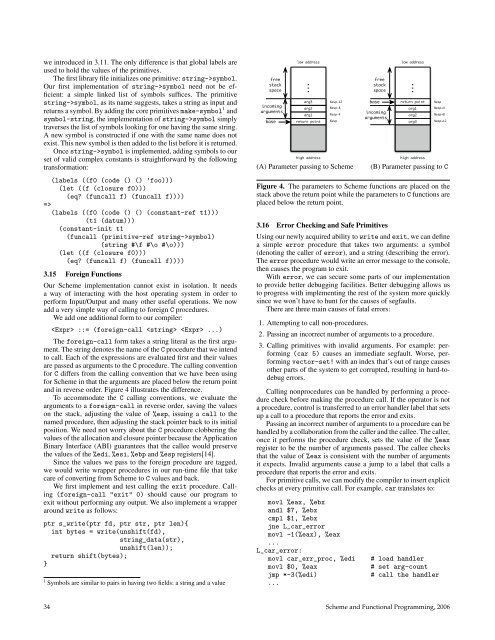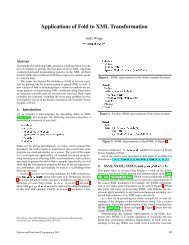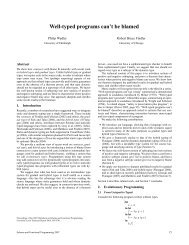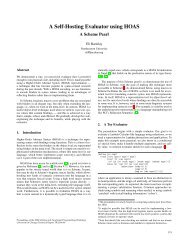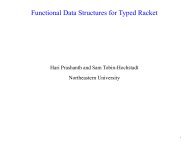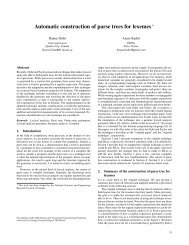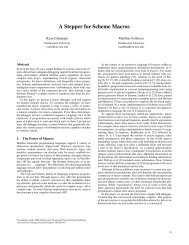2006 Scheme and Functional Programming Papers, University of
2006 Scheme and Functional Programming Papers, University of
2006 Scheme and Functional Programming Papers, University of
You also want an ePaper? Increase the reach of your titles
YUMPU automatically turns print PDFs into web optimized ePapers that Google loves.
we introduced in 3.11. The only difference is that global labels are<br />
used to hold the values <strong>of</strong> the primitives.<br />
The first library file initializes one primitive: string->symbol.<br />
Our first implementation <strong>of</strong> string->symbol need not be efficient:<br />
a simple linked list <strong>of</strong> symbols suffices. The primitive<br />
string->symbol, as its name suggests, takes a string as input <strong>and</strong><br />
returns a symbol. By adding the core primitives make-symbol 1 <strong>and</strong><br />
symbol-string, the implementation <strong>of</strong> string->symbol simply<br />
traverses the list <strong>of</strong> symbols looking for one having the same string.<br />
A new symbol is constructed if one with the same name does not<br />
exist. This new symbol is then added to the list before it is returned.<br />
Once string->symbol is implemented, adding symbols to our<br />
set <strong>of</strong> valid complex constants is straightforward by the following<br />
transformation:<br />
(labels ((f0 (code () () ’foo)))<br />
(let ((f (closure f0)))<br />
(eq? (funcall f) (funcall f))))<br />
=><br />
(labels ((f0 (code () () (constant-ref t1)))<br />
(t1 (datum)))<br />
(constant-init t1<br />
(funcall (primitive-ref string->symbol)<br />
(string #\f #\o #\o)))<br />
(let ((f (closure f0)))<br />
(eq? (funcall f) (funcall f))))<br />
3.15 Foreign Functions<br />
Our <strong>Scheme</strong> implementation cannot exist in isolation. It needs<br />
a way <strong>of</strong> interacting with the host operating system in order to<br />
perform Input/Output <strong>and</strong> many other useful operations. We now<br />
add a very simple way <strong>of</strong> calling to foreign C procedures.<br />
We add one additional form to our compiler:<br />
::= (foreign-call ...)<br />
The foreign-call form takes a string literal as the first argument.<br />
The string denotes the name <strong>of</strong> the C procedure that we intend<br />
to call. Each <strong>of</strong> the expressions are evaluated first <strong>and</strong> their values<br />
are passed as arguments to the C procedure. The calling convention<br />
for C differs from the calling convention that we have been using<br />
for <strong>Scheme</strong> in that the arguments are placed below the return point<br />
<strong>and</strong> in reverse order. Figure 4 illustrates the difference.<br />
To accommodate the C calling conventions, we evaluate the<br />
arguments to a foreign-call in reverse order, saving the values<br />
on the stack, adjusting the value <strong>of</strong> %esp, issuing a call to the<br />
named procedure, then adjusting the stack pointer back to its initial<br />
position. We need not worry about the C procedure clobbering the<br />
values <strong>of</strong> the allocation <strong>and</strong> closure pointer because the Application<br />
Binary Interface (ABI) guarantees that the callee would preserve<br />
the values <strong>of</strong> the %edi, %esi, %ebp <strong>and</strong> %esp registers[14].<br />
Since the values we pass to the foreign procedure are tagged,<br />
we would write wrapper procedures in our run-time file that take<br />
care <strong>of</strong> converting from <strong>Scheme</strong> to C values <strong>and</strong> back.<br />
We first implement <strong>and</strong> test calling the exit procedure. Calling<br />
(foreign-call "exit" 0) should cause our program to<br />
exit without performing any output. We also implement a wrapper<br />
around write as follows:<br />
ptr s_write(ptr fd, ptr str, ptr len){<br />
int bytes = write(unshift(fd),<br />
string_data(str),<br />
unshift(len));<br />
return shift(bytes);<br />
}<br />
1 Symbols are similar to pairs in having two fields: a string <strong>and</strong> a value<br />
free<br />
stack<br />
space<br />
incoming<br />
arguments<br />
base<br />
low address<br />
<br />
arg3<br />
arg2<br />
arg1<br />
return point<br />
high address<br />
%esp-12<br />
%esp-8<br />
%esp-4<br />
%esp<br />
(A) Parameter passing to <strong>Scheme</strong><br />
free<br />
stack<br />
space<br />
base<br />
incoming<br />
arguments<br />
low address<br />
<br />
return point<br />
arg1<br />
arg2<br />
arg3<br />
high address<br />
%esp<br />
%esp+4<br />
%esp+8<br />
%esp+12<br />
(B) Parameter passing to C<br />
Figure 4. The parameters to <strong>Scheme</strong> functions are placed on the<br />
stack above the return point while the parameters to C functions are<br />
placed below the return point.<br />
3.16 Error Checking <strong>and</strong> Safe Primitives<br />
Using our newly acquired ability to write <strong>and</strong> exit, we can define<br />
a simple error procedure that takes two arguments: a symbol<br />
(denoting the caller <strong>of</strong> error), <strong>and</strong> a string (describing the error).<br />
The error procedure would write an error message to the console,<br />
then causes the program to exit.<br />
With error, we can secure some parts <strong>of</strong> our implementation<br />
to provide better debugging facilities. Better debugging allows us<br />
to progress with implementing the rest <strong>of</strong> the system more quickly<br />
since we won’t have to hunt for the causes <strong>of</strong> segfaults.<br />
There are three main causes <strong>of</strong> fatal errors:<br />
1. Attempting to call non-procedures.<br />
2. Passing an incorrect number <strong>of</strong> arguments to a procedure.<br />
3. Calling primitives with invalid arguments. For example: performing<br />
(car 5) causes an immediate segfault. Worse, performing<br />
vector-set! with an index that’s out <strong>of</strong> range causes<br />
other parts <strong>of</strong> the system to get corrupted, resulting in hard-todebug<br />
errors.<br />
Calling nonprocedures can be h<strong>and</strong>led by performing a procedure<br />
check before making the procedure call. If the operator is not<br />
a procedure, control is transferred to an error h<strong>and</strong>ler label that sets<br />
up a call to a procedure that reports the error <strong>and</strong> exits.<br />
Passing an incorrect number <strong>of</strong> arguments to a procedure can be<br />
h<strong>and</strong>led by a collaboration from the caller <strong>and</strong> the callee. The caller,<br />
once it performs the procedure check, sets the value <strong>of</strong> the %eax<br />
register to be the number <strong>of</strong> arguments passed. The callee checks<br />
that the value <strong>of</strong> %eax is consistent with the number <strong>of</strong> arguments<br />
it expects. Invalid arguments cause a jump to a label that calls a<br />
procedure that reports the error <strong>and</strong> exits.<br />
For primitive calls, we can modify the compiler to insert explicit<br />
checks at every primitive call. For example, car translates to:<br />
movl %eax, %ebx<br />
<strong>and</strong>l $7, %ebx<br />
cmpl $1, %ebx<br />
jne L_car_error<br />
movl -1(%eax), %eax<br />
...<br />
L_car_error:<br />
movl car_err_proc, %edi<br />
movl $0, %eax<br />
jmp *-3(%edi)<br />
...<br />
# load h<strong>and</strong>ler<br />
# set arg-count<br />
# call the h<strong>and</strong>ler<br />
34 <strong>Scheme</strong> <strong>and</strong> <strong>Functional</strong> <strong>Programming</strong>, <strong>2006</strong>


